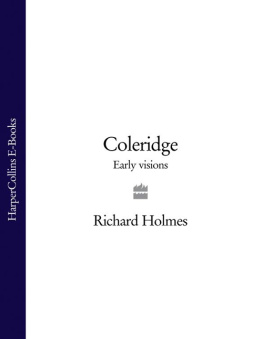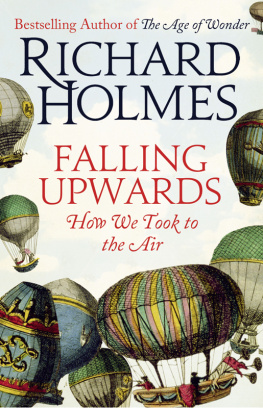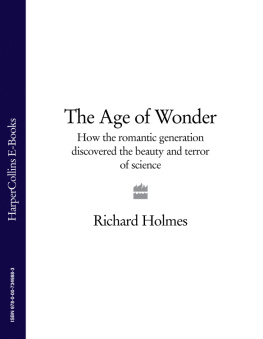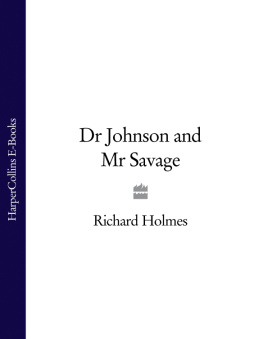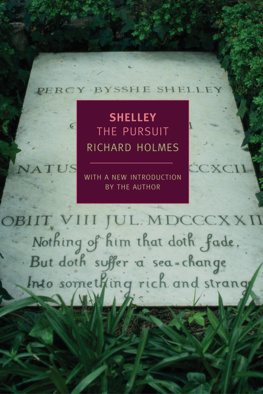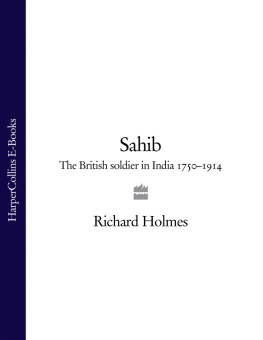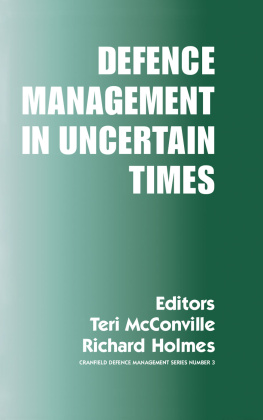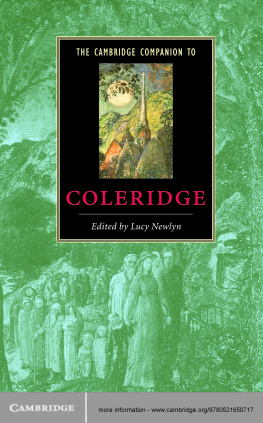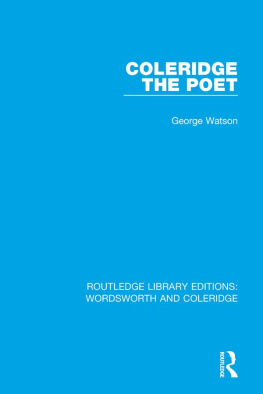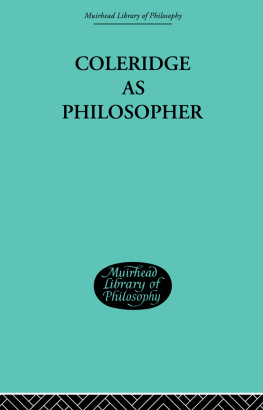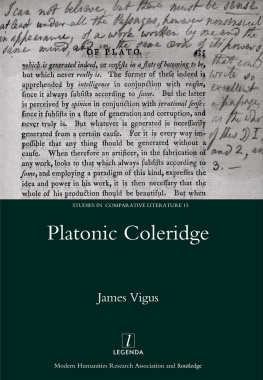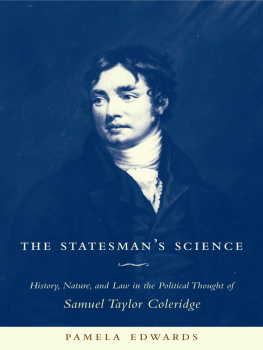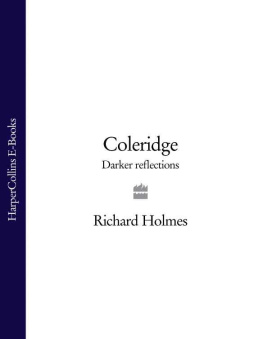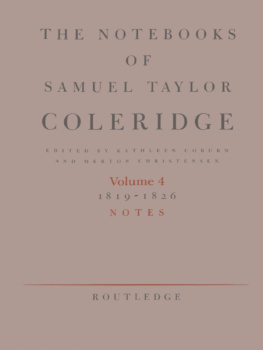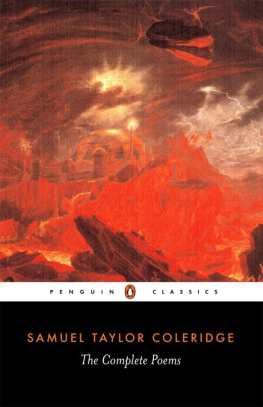To Vicki
Anyone who presumes to write about Coleridge runs the grave risk of sounding like the person on business from Porlock, a prosaic interrupter of marvels.
But some years ago, I suggested (anonymously) in The Oxford Companion to English Literature that Coleridges best work, both poetry and prose, has the inescapable glow of the authentic visionary. This biography has become my attempt to substantiate that wild claim, and to show what sort of visionary Coleridge really was, and why among all the English Romantics he is worth rediscovering today.
Wordsworth called him the most wonderful man he had ever known; but many subsequent biographers have been sceptical. It would seem possible to write an entire book on Coleridges opium addiction, his plagiarisms, his fecklessness in marriage, his political apostasy, his sexual fantasies, or his radiations of mystic humbug. And indeed, all these books have been written. But no biographer, since James Dykes Campbell in 1894, has tried to examine his entire life in a broad and sympathetic manner, and to ask the one vital question: what made Coleridge for all his extravagant panoply of faults such an extraordinary man, such an extraordinary mind?
The most radical thing about the present book the first of two volumes is simply that it is a defence of Coleridge in these terms. I have attempted to recapture his fascination as a man and a writer, and above all to make him live, move, talk, and have his being. If he does not leap out of these pages brilliant, animated, endlessly provoking and invade your imagination (as he has done mine), then I have failed to do him justice.
The present volume takes Coleridge to the age of thirty-one, the exact halfway point in his career, and his departure for Malta in 1804, the year before the Battle of Trafalgar. But it uses materials drawn from the second half of his life notably his labyrinthine autobiography, the Biographia Literaria (written in Wiltshire in 181415), and his journalism in The Friend, a paper he wrote and edited in the Lake District in 180910. Coleridge, like many later nineteenth-century writers (Dickens, Hardy, Kipling) worked hard to reconstruct the truth of his early experiences and opinions, and this double vision, or duplicity, is an important theme from the start. It is partly for this reason that my second volume will be entitled: Darker Reflections.
In his first thirty years Coleridge wrote much of the poetry for which he is now remembered: Kubla Khan, The Rime of the Ancient Mariner, Christabel, Frost at Midnight, and Dejection: an Ode. Many of these have become part of the folklore of Romanticism, and entered proverbially into the language an albatross, an ancient mariner type, a journey to Xanadu. But what is much less well-known, is that Coleridge went on rewriting, improving, and re-presenting them in later life (the most famous case being the preface to Kubla Khan, and the highly significant arrival of that person from Porlock), and I shall have more to say about their development in volume two. His play Osorio, which was written in 1798 but first performed as Remorse in 1812, will also receive further attention. Moreover there is much major but neglected poetry yet to come: To William Wordsworth (1807), Constancy to an Ideal Object (180525), or The Garden of Boccaccio (1828).
Contrary to legend, Coleridge remained a poet throughout his life, and his later work the poetry of old age and failing vision is some of the most moving and revealing. It is impossible to understand him without reference to such works as A Tombless Epitaph (1811), which re-explores the symbolic caverns of his youth, as already appears in this volume.
The sequence of autobiographical verse known as the Conversation Poems, which runs from 1794 to 1807, seems to me perhaps his finest poetic achievement (without which Wordsworth would never have developed The Prelude). I have examined its themes closely in my narrative, suggesting that our notion of Romanticism itself partly grows out of them. Coleridge (and Wordsworth) used the word Romantic largely in a loose, eighteenth-century, topographical sense that deep Romantic chasm, or even on one memorable occasion that old Romantic goat to denote the visually wild and sublime (sometimes comically so). But they were equally conscious of using language experimentally, and creating a revolution in taste and sensibility. So I have also freely used the term with its modern, critical implications (disputed of course) to denote that new element of imaginative power and intensity of self-expression which we now associate with the period of political and cultural revolution throughout Europe between 1780 and 1830.
But Coleridge was much more than a Romantic poet: he was also a journalist of genius, a translator, a matchless letter-writer (six volumes), an incomparable autobiographer and self-interrogator in his Notebooks (over sixty surviving between 1794 and his death), a literary critic, a spectacular lecturer, a folklorist, a philosopher, a psychologist (specialising in dreams and creativity), a playwright and dramatic critic, and that much disputed word a metaphysician. He was also a travel-writer, a fell-walker, and amateur naturalist with an inspired eye for movement and transformation processes cloud structures, plant growth, animal activity, light shifts, water changes, wind effects. All these aspects I have tried to bring alive, although Coleridge scholars will know what dreadful chasms (such as English and German Idealist philosophy) I have perilously skimmed over, in this first volume at any rate.
Indeed, on the surface at least, I hope this book will read like the most traditional form of popular narrative biography. Coleridge is such a difficult subject his personality so complex, the exact nature of his literary gift so protean, his daily life contained so much in pure ideas that the real challenge for me has been simply to unearth his human story, his living footsteps through the world. Even his vast array of friends, among the living and among the dead, have not been allowed to obstruct the tale unnecessarily, but find a subsidiary place in a form of dramatis personae listing, Coleridges Circle, at the end of the book.
The tendency of much recent scholarship, following the example of Professor John Livingston Lowes in The Road to Xanadu (1927, see Bibliography), has been to see Coleridges whole imaginative existence as one gigantic booklist, the life of a library cormorant (Coleridges own mocking phrase), alive only in annotations and influences. Instead, I have taken Coleridge into the open air. I have made the fullest use possible of the superb editorial work of E. L. Griggs on the letters, and Kathleen Coburn on the Notebooks (an epic of modern exegesis). I have emphasised Coleridges physical presence as much as his metaphysical one (Leigh Hunt said shrewdly that he was a mighty intellect put upon a sensual bodyvery metaphysical and very corporeal): he seemed to learn as much from landscapes as from literature; as much from childrens games as from philosophic treatises; as much from bird-flight as from theology.
Despite the traditional form of my narrative, I have tried certain biographical experiments, two of which might be mentioned. Coleridge is remembered as the greatest talker of his age that ephemeral form most difficult to re-create in biography (unless you are James Boswell, at your subjects elbow). So I have attempted, from the very start, to set Coleridge talking, to tell his story through his own magnificent and constantly humorous flights of phrase and metaphor. I have tried to make his

